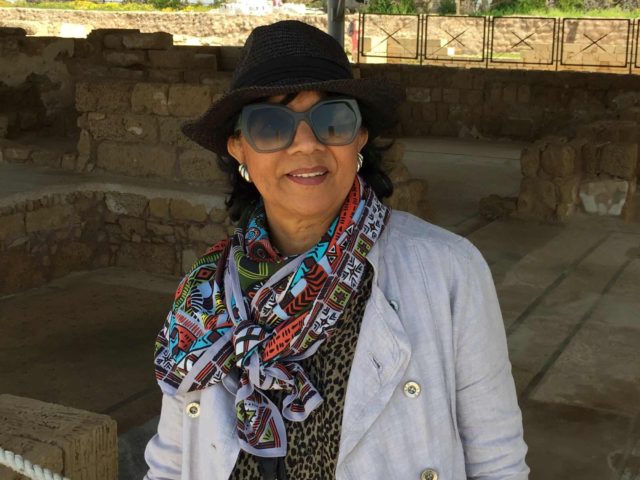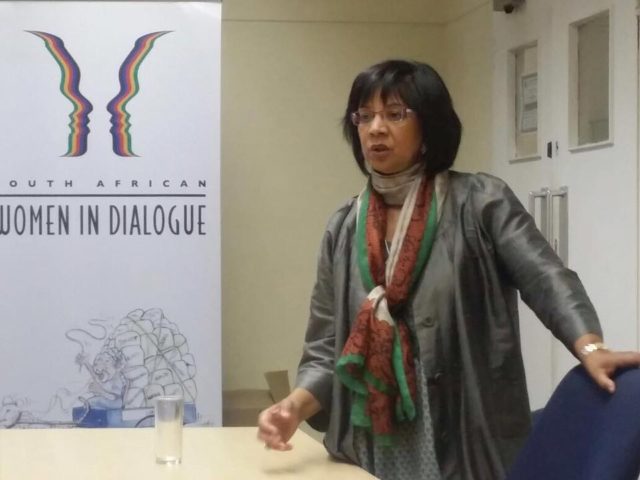Rhoda Kadalie’s support for Israel was among the more controversial stances taken by the late anti-apartheid activist, feminist, and columnist, who died last week at 68 after a battle with lung cancer.
Among many of Rhoda’s former comrades from South Africa’s “struggle,” her pro-Israel view was an even greater mystery than her support for Donald Trump.
Some blamed her Jewish, right-wing, Zionist son-in-law (i.e. this author), but in fact her stance long preceded that relationship.
When asked directly about the source of her support for Israel, Rhoda would often cite her Christian upbringing. But that alone was not the reason.
While Rhoda nurtured a deep commitment to her faith, she was not inclined to let it dictate her political views. She argued for abortion rights (though she later opposed late-term abortion); she pushed for women to be ordained as ministers; and she championed gay and lesbian rights within the church at a time when doing so was radical.
What might be said is that Rhoda’s deeply-rooted, positive view of Israel as the Holy Land probably made her less inclined to follow the rest of the left as it began to abandon its once sympathetic approach to Israel as a refuge for persecuted Jews, and instead to embrace the fallacy of Israel as a settler-colonialist state akin to apartheid South Africa itself.
Rhoda’s pro-Israel views first emerged as a reaction to antisemitism, and then in reaction to the post-apartheid government’s self-defeating obsessions.
Rhoda began to speak out publicly about the issue in the late 1990s, as a member of South Africa’s Human Rights Commission, when anti-Israel radicals began to make their presence felt in Cape Town and throughout the country.
After demonstrators marched to the Israeli consulate in 1997 chanting “one Zionist, one bullet,” she warned that such slogans “openly incite racial hatred and violence,” even if organizers might claim they were only against “Zionists” and not Jews.
She also spoke out against antisemitic violence, after Jewish institutions and even residential homes were targeted by anti-Israel and Islamist radicals. She did not water down her objections to antisemitism, as some other South African public figures were later wont to do, with criticisms of Israel.
(Similarly, Rhoda’s grandfather, Clements Kadalie, the first black trade unionist in South Africa, also spoke out against antisemitism on the left in the 1930s, before it was fashionable to do so.)
Rhoda became more outspoken after the disastrous World Conference Against Racism in Durban in 2001, which anti-Israel organizations hijacked and turned into an antisemitic hatefest.
Concluding that the Durban conference had “generated more race hate than it mobilized against racism,” Rhoda began attacking the South African government’s growing obsession with Israel as a way to distract from its failures at home, and its bizarre policy of support for the Mugabe regime in Zimbabwe.
When Ronnie Kasrils, a communist and Jewish member of the South African cabinet, began urging fellow Jews to sign a petition opposing Israel in 2001, she dismissed his effort as a cynical tactic by the ruling party to court Muslim votes at home, and cultivate Arab states’ support for a seat on the UN Security Council.
Nothing rankled Rhoda more than hypocrisy, and she noted that Israel’s most vocal critics were usually silent about human rights abuses in Africa and the Muslim world.
As she explored the issue more deeply, Rhoda was drawn to the writings of Phyllis Chesler, a feminist writer who dissented from the left over its increasing hostility toward Israel and its blindness toward radical Islam.
Chesler is critical of some Israeli policies, and is active in Women of the Wall, a group that pressures Israeli religious authorities to allow women to lead traditional prayers at Judaism’s holiest site in Jerusalem.
Yet she supported Israel against terrorism and demonization, writing in 2002:
Since September 11, many progressive Westerners … have continued to focus on the moral failures of Israel and America instead of the enemy at our gates—as if demonizing Jews or the American government will keep us safe. … Israel is increasingly being treated as the symbolic scapegoat for all the crimes committed by both colonial Europe and repressive Arab regimes—a classic position for the Jews in human history.
To Chesler, as to Rhoda, the obsession with Israel was a distraction from the left’s own failures.
Rhoda longed for South Africa to move beyond a “struggle” paradigm, both in domestic and foreign affairs, and to govern with the benefit of its citizens as the main objective.
Thus she began arguing for a strong relationship with Israel as economically beneficial to South Africa, especially given the potential role of the prosperous local Jewish community. She opposed academic boycotts of Israel, arguing Israeli campuses enjoyed greater academic freedom than South Africa’s own.
In later years, Rhoda had opportunities to visit Israel and experience it firsthand, which reinforced her views. She noted wryly that some black South African journalists whom she accompanied on an official media tour were befuddled when the “apartheid” they had been led expect failed to materialize.
In 2008, Rhoda co-wrote an article with her daughter, Julia Pollak (née Bertelsmann), refuting the false “Israel-apartheid” analogy, noting in particular the intransigence of the Palestinians.
For Rhoda, who worked with government projects even as she criticized South Africa’s ruling party in print, the Palestinians’ lack of interest in negotiation or building their own institutions was inexcusable.
In its most idealistic form, i.e. on Western campuses, the Palestinian cause proposed a unitary state for Jews and Arabs. Rhoda knew, from South Africa’s experience, that such utopias were not enough.
What was needed was leadership — which Israel had, and Palestinians, still today, do not.
Joel B. Pollak is Senior Editor-at-Large at Breitbart News and the host of Breitbart News Sunday on Sirius XM Patriot on Sunday evenings from 7 p.m. to 10 p.m. ET (4 p.m. to 7 p.m. PT). He is the author of the forthcoming biography, Rhoda: Comrade Kadalie, You Are Out of Order!. He is a winner of the 2018 Robert Novak Journalism Alumni Fellowship. Follow him on Twitter at @joelpollak.


COMMENTS
Please let us know if you're having issues with commenting.